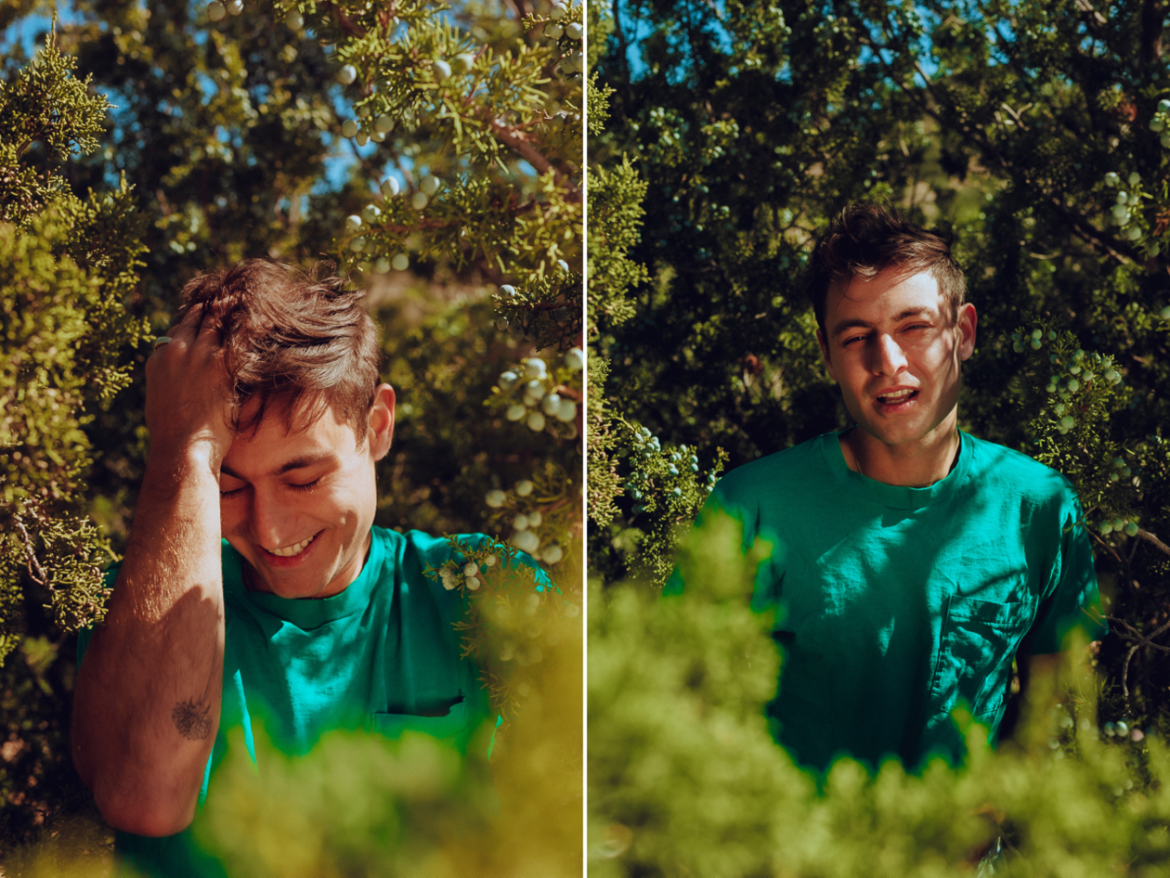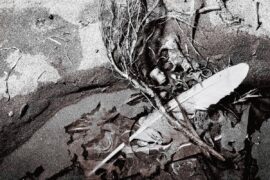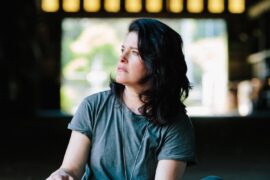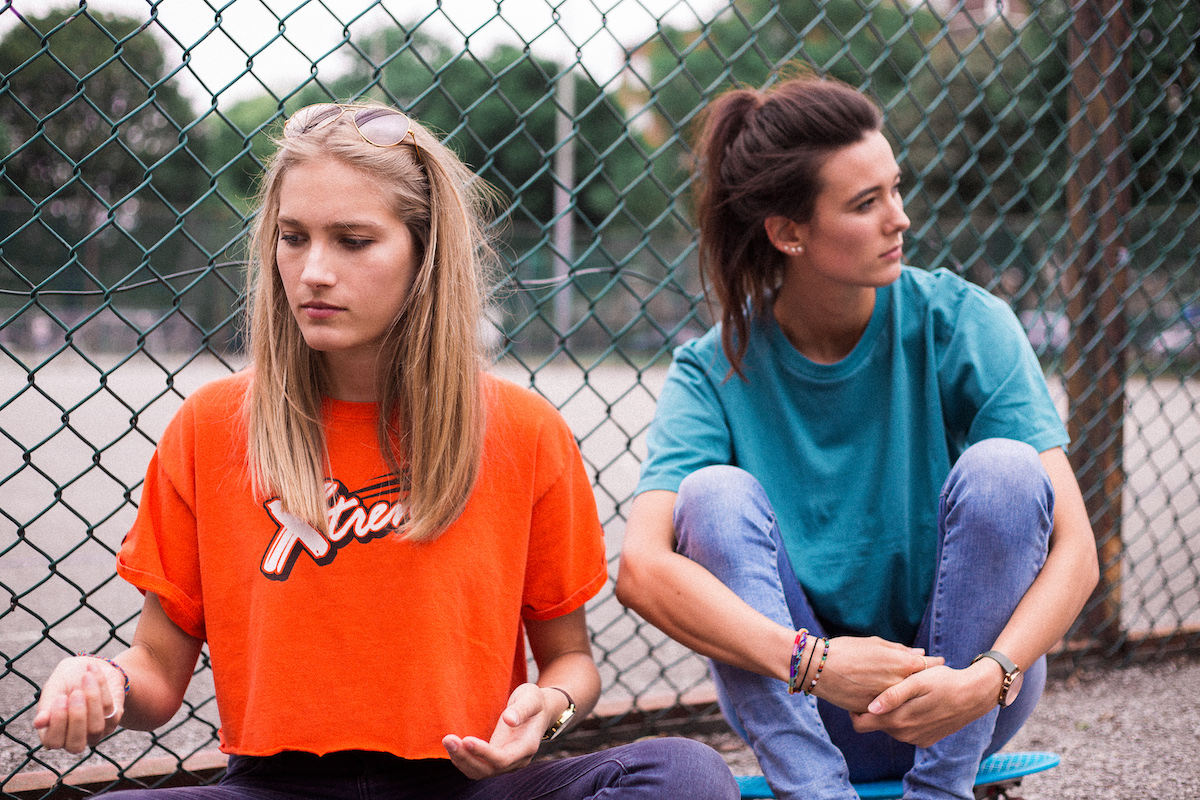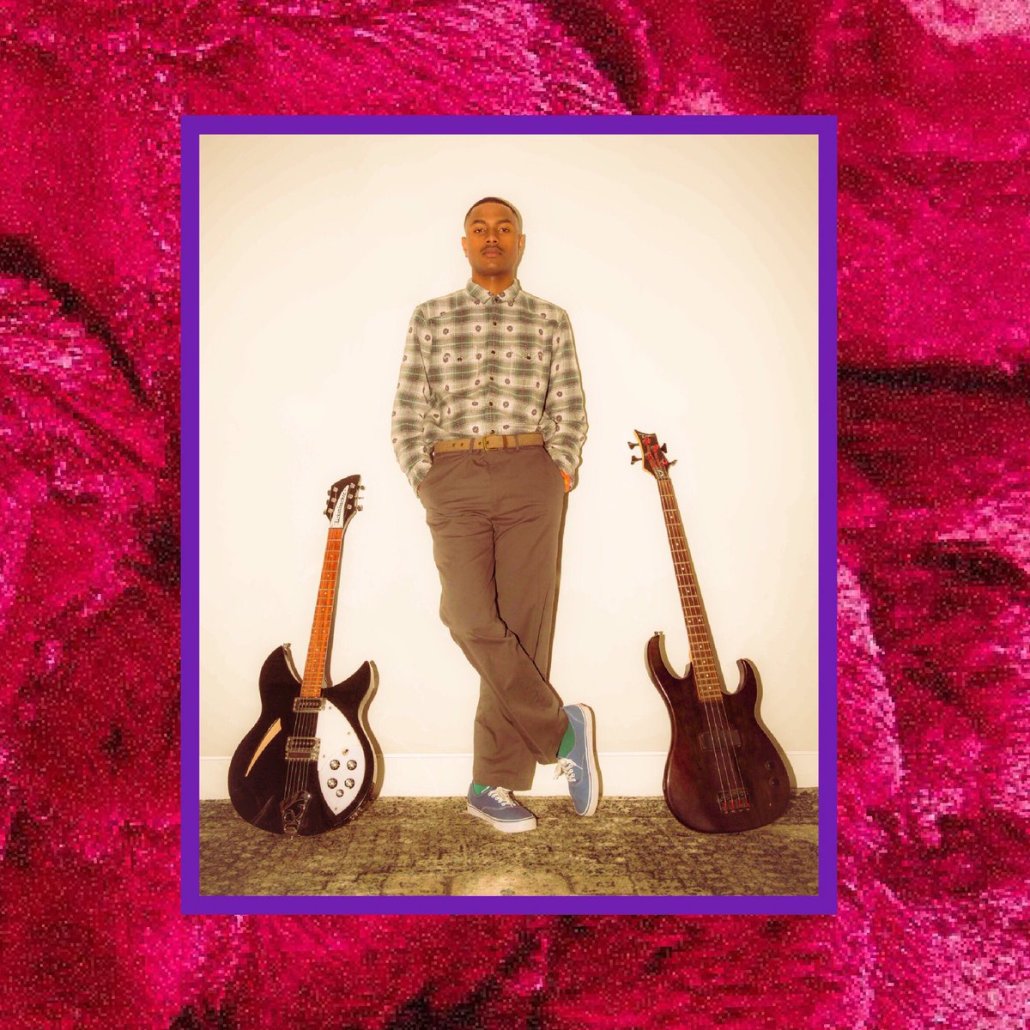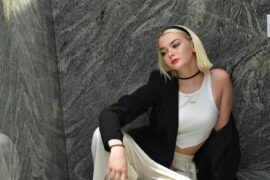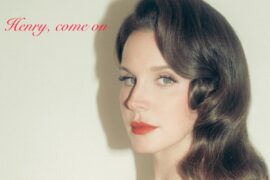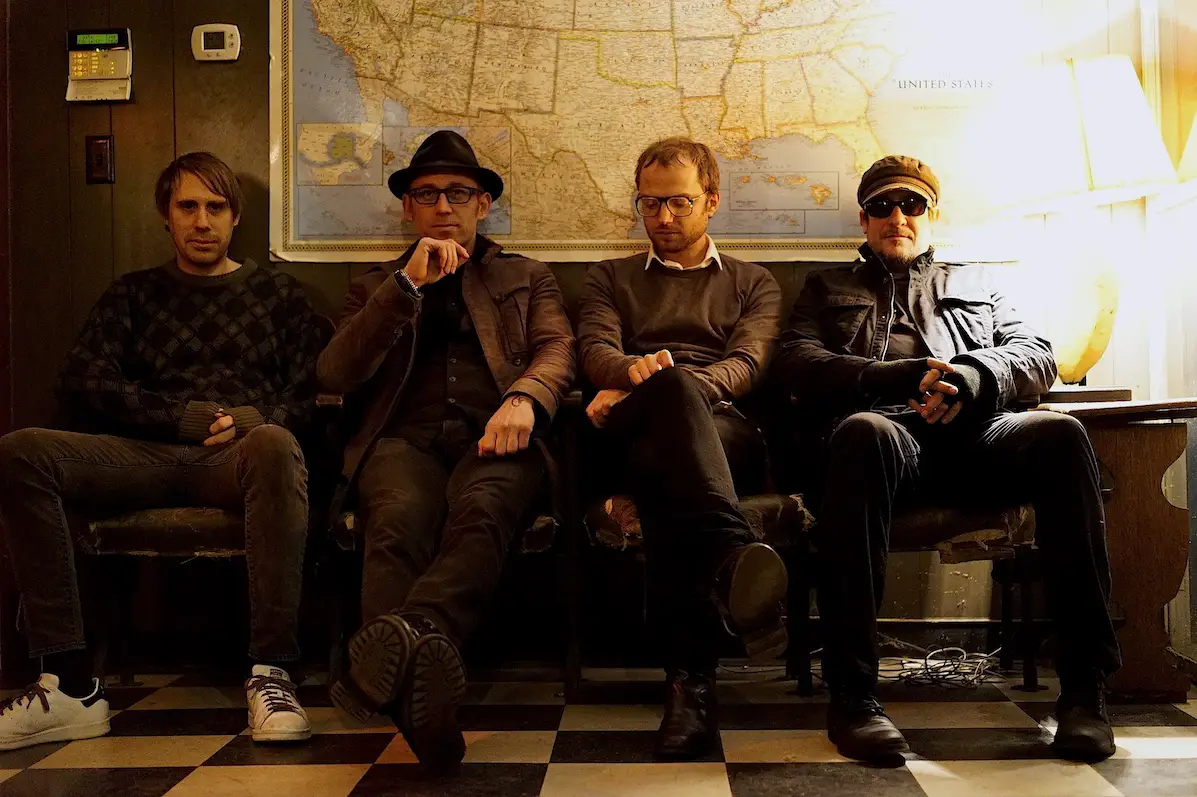Atwood Magazine caught up with Yoke Lore to speak about scoring Pink Skies Ahead, how in the world you score a panic attack, and what about this experience will inform Yoke Lore’s next releases.
— —
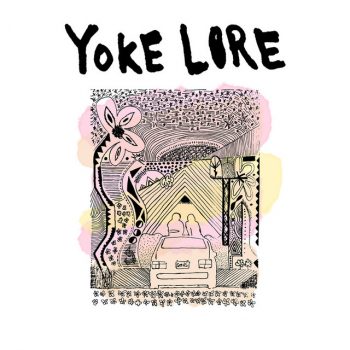 Winona is a blue-haired, irreverent young adult who just wants to live, man. After leaving her creative writing classes at college and moving back into her parents’ home, Winona tries to settle back into a routine that moved on without her, searches for herself without realising she’s doing so. Her bright blue hair calls you in, but her intoxicating, bubbly personality is the gravity that makes you love to watch her as she grows.
Winona is a blue-haired, irreverent young adult who just wants to live, man. After leaving her creative writing classes at college and moving back into her parents’ home, Winona tries to settle back into a routine that moved on without her, searches for herself without realising she’s doing so. Her bright blue hair calls you in, but her intoxicating, bubbly personality is the gravity that makes you love to watch her as she grows.
And growing up means going through some uncomfortable shit. Like finding out from your paediatrician, as an adult, that your hypochondriac tendencies actually covered up an anxiety and panic disorder. Ignoring this diagnosis and moving on with your life seems like the only logical step.
This is the premise of Pink Skies Ahead, Kelly Oxford’s directorial debut starring Jessica Barden. Oxford, whose autobiographical essay inspired Winona, is the heart and eyes with whom we follow Winona – from mushroom trips and raves to group therapy sessions and awkward mother-in-law meetings. The ears to Oxford’s eyes are Adrian Galvin (aka Yoke Lore) and Ariel Loh, whose score effortlessly adapts itself to Winona’s reality regardless of how distinct one moment can seem from the next.
Along with the score, Galvin also wrote a Yoke Lore original song, “Seeds”, which soundtracks the movie’s credits and was inspired by the first time he saw Barden as Winona.
Atwood Magazine caught up with Yoke Lore to speak about scoring Pink Skies Ahead, how in the world you score a panic attack, and what about this experience will inform Yoke Lore’s next releases.
Watch: Pink Skies Ahead Trailer
Listen: “Seeds” – Yoke Lore
:: A Conversation with Yoke Lore ::
Atwood Magazine: Hi Adrian, so great to catch up! How has this crazy world been treating you?
Yoke Lore: It’s actually been pretty good. The pandemic has been kind to me. And I feel like most people that kind of do work that involves personal exploration thrive during this time of closure and isolation.
I read another interview where someone was like, ‘it‘s really annoying that the pandemic has been really great for Adrian, and not for everybody else’.
Yoke Lore: (laughs)
I want to congratulate you on the score and the single for Pink Skies Ahead. I‘ve been looking forward to this movie ever since I heard it was a thing, then watching it and understanding the world that was created, with the music and everything was all so beautiful. What made you want to enter this world that Kelly (Oxford, director) was creating and write the movie’s score?
Yoke Lore: I don’t know if she ever really formally asked me. I was kind of just there when it all kind of happened when she got the deal and it kind of developed and she started putting it together. We were talking out the whole thing and talking about music, and I was honoured to be part of those conversations. It was a cool thing to be like part of from the beginning. I guess it helped me from a scorer’s point of view, because I understood the seeds of the idea and the reason why she was telling the story and how it already meant so much to a lot of people. I think being a part of the creation from the beginning made me doing this score just make sense and it also made the score a lot easier to make, just because it was it felt like an extension of continuing to collaborate with Kelly and trying to bring her narrative to life.
As Yoke Lore you‘ve never released an instrumental, how do you process the idea of not only telling someone else‘s story, so doing the talking for somebody else through music, but then not having words to guide you through it?
Yoke Lore: I guess that’s really where I so respect and trust Kelly as an artist and as a writer, because I totally felt like I didn’t need to say anything. She said it all really eloquently and really powerfully. I didn’t feel like I could add much rhetorically to her work, but it is strange because I feel like Yoke Lore’s identity is kind of wrapped up in my voice and how my voice sounds because it’s so shrill and specific. Doing something without that really, singularly identifying quality was, I think, both a challenge, but also liberating in a way. I sometimes feel weighed down by my own instincts or my own patterns that I get stuck repeating or something. You know, I always feel like I’m fighting against my own gut reactions to things, I then have to be like, wait a minute, maybe don’t say that, or maybe like, don’t write that inside, I feel like yeah, this kind of forced me to engage that second nature of myself, and try to really, you know, try to, like, use another way of communicating. Like, everyone should be like, you know, all musicians that should be exercising, and kind of like, developing that practice of learning how to, like, speak to people with with just really subtly, you know, I also feel like I’m always playing these, like, massive sounds and these like, you know, huge, like 15 layers of banjos and like 10 vocal layers, and like, all these harmonies and stuff, and you know, a lot of this or it’s like, a single guitar. And so it is really cool to just like, explore a different route.

Can you tell us, on a practical level, how scoring works? Do you go to set, do you compose music before or only with the final cut…
Yoke Lore: I think it happens a lot of different ways. With us, the score was there from the beginning, but I’ve also heard of people getting entire films and composing after it’s done. We would get sent dailies, which are just unedited tapes, and we basically would watch it once and then just put it on mute and explore. I always had ideas of instruments that I wanted to focus on, like, you know, it’s a movie about the ‘90s about a girl who listens to Hole and Smashing Pumpkins, there had to be electric guitars. I definitely wanted to preserve the sonic palette and wanted to try to speak that 90s language to people.
You also wrote a song for the soundtrack, and I saw a post that you did, talking about how “Seeds” just came out of you when you first saw Jessica (Barden) play Winona.
Yoke Lore: One of the first things I saw, and this is like the first week of shooting, was the panic sequence. I hadn’t met her yet, I had just come back from tour and they’d started shooting pretty recently and they sent that over. I was like, ‘Dude, shit, this girl’s in it, and she can really fucking do it’ and I basically wrote a love song to her in that in that moment. It was also kind of to Kelly in that part of her life, not knowing her then and not being able to help her through that and looking back on it and feeling sad that she had to go through it alone. She had wonderful people around her as the film talks about, but, you know, now being with her and having those instincts to help her and to protect her.,, It’s strange to have that narrative, to have to contend with that story of hers. I think it also helped me to process my own feelings about it. I have this instinct to help out, to deal with things, to fix shit, and when I’m given that story, my instinct is like ‘how do I help? How do I help fix this?’. I think the song was my way of trying to deal with that weird instinct of wanting to really save Winona and not being able to.
As someone who has panic attacks, it’s very weird to see them on screen. But I was thinking while I was watching the scene, how do you score a panic attack? What goes through your mind?
Yoke Lore: Like I said, it was one of the first things we saw. I don’t have panic attacks, I’ve never experienced that kind of anxiety. And I think the way Winona portrayed it, I saw it as almost like a veil that comes down and cuts you off from everything in a way. I felt like Kelly’s kind of showing that in a way, visually, with Winona not feeling comfortable in her own space and her own skin, not feeling like she can speak and not understanding hwe emotional volatility. It’s all like a disconnect from what’s really happening, what reality is. So I felt like I just needed to create a reality where sound was kind of cut off in a way. Like when you’re holding your ears and all you get are really low frequencies. I just wanted something that blew out the low end of the frequency spectrum, and rode this kind of drone that I’ve heard that the deaf sometimes can experience this kind of like low drone, because all their frequencies are cut off. I just wanted the veil of reality to come down and just block everything, in terms of sound nothing could reach her.
Were there any guiding feelings or words that you used while scoring the movie or a specific scene? Or do you just literally go with the flow, use your instinct and see what goes on?
Yoke Lore: Kelly and I definitely thoroughly talked a lot about what she needed for certain scenes, in terms of like, where she needed to go or the kind of rhythmic sequence of events and how fast she wanted that to feel or how slow she wanted that to feel. But a lot of it was like, we had a bunch of guitars and a bunch of synths in a room and we just watched it and just created. We made a ton that didn’t eventually end up in and so there was a lot of experimentation that led us to certain places that were dead ends and others led us to themes that we kept coming back to.

Was there a specific scene or moment during the scoring of this movie that was a breakthrough?
Yoke Lore: I’m pretty proud of the club scene song. We created that techno song for the club scene and I’m pretty proud of that. I also think one of the breakthrough moments for me in understanding the score itself was the mushroom scene. I remember me and Ariel were watching it and we were both on synths, both watching each other and playing. And we ended up just using what we did that day because we were both just feeling it and it just happened to work out. But that was really a grounding kind of ‘Okay, we got this’ moment.
Since Pink Skies Ahead is largely about mental health, I want to ask you, and feel free to answer to the extent you feel comfortable with, what’s your own journey with mental health like?
Yoke Lore: Kelly is the first person I’ve really known who’s had a mental health journey. I’m not sure, I feel like there have been people in my life who have struggled with their mental health, who, in the past, haven’t really been able to talk about it and deal with it. But I’ve lived a sheltered life and I haven’t been exposed to a lot of it. And I’m just now realising how ubiquitous it is, and how broad it is. I think a lot of people’s perspective, right now is getting expanded because of the spotlight that’s been put on mental health in recent years and in the widening conversation that we’ve been able to have about, you know, expanding the availability of mental health counselling and therapy and other forms of treatment, it’s just become like a part of our, our lives. Even though I haven’t had a mental health journey myself, and even though I haven’t been exposed to a lot of it, I feel like it’s kind of my responsibility to talk about it and to offer people resources with which I think they can help themselves. It’s a lot more common and a lot more normal than we make it out to be, and the more we talk about it and offer each other ways of dealing with it, and we can all be part of the conversation, whether or not we’ve gone through it ourselves.
Okay, last question. How did scoring the movie inform Yoke Lore’s music?
Yoke Lore: I think it definitely allowed me to do more with negative space. Not feeling like I have to say everything. I’ve kind of felt like my music has to do everything in every song, I feel like I’ve been really concerned with having huge dynamic range, so that I cover every feeling. I’ve wanted songs to havereally intimate moments and like, really massive, triumphant moments. And I’m learning that I shouldn’t try to do everything all at once all the time.That things can just be their own piece of something. So I’ve started to write more songs that, on their own, dominate a certain space, and just stay in that space without having to go over there and do that other thing as well.
:: stream/purchase “Seeds” here ::
:: stream/rent/buy Pink Skies Ahead here ::
— —
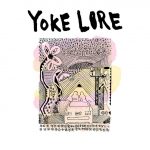
Connect with Yoke Lore on
Facebook, Instagram, Twitter
Discover new music on Atwood Magazine
? © Emma Mead

